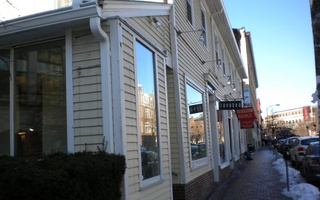Since fall 2011, North Allston has witnessed a spate of businesses open in Harvard-owned properties lining Western Ave.—many of which had sat vacant for more than a year. Harvard’s new tenants say that they have found an advantageous and profitable home in the Allston community and an exemplary landlord in the University.
Stone Hearth Pizza Company owner Jonathan Schwarz, whose restaurant opened last November, praised the Allston community for its “overwhelming” support of his business.
“The locals have been really amazing and supportive,” Schwarz said. “Without their enormous generosity, we would not be faring anywhere near as well as we are now.”
Schwarz praised the prominent Western Ave. location of the newest outpost of his small restaurant chain.
“Harvard leased us this really visible space, and that’s been really important,” Schwarz said. “People can see the restaurant when they’re driving or walking by. It makes a huge difference.”
Gregory Salvucci, whose company, Signal Graphics, opened earlier this year, echoed Schwarz’s sentiments on the importance of community support and a conspicuous spot for attracting new business in the area.
“Some of the local companies have been really great about getting involved,” said Salvucci, who has done work for Harvard Business School, the Graduate School of Education, and the Harvard Ballroom Dance Team. “And I have people who live close by who also come in. I think that good visibility to the traffic flow on the street is responsible for that.”
Harvard’s original master plan for development on its Allston lands, released in 2007, included the creation of a vibrant “main street” on Western Ave. in addition to the construction of a $1 billion Science Complex. When the University halted construction on the Science Complex in 2009 due to financial trouble, many Harvard-owned properties on Western Ave. were left empty.
In Dec. 2009, University President Drew G. Faust voiced the University’s new focus on “aggressive and effective leasing of vacant or partially vacant Harvard properties” in Allston. At the time, 65 percent of Harvard’s leasable holdings were occupied.
Since then, the University has signed 19 leases—increasing its occupancy rate to 92 percent. The first months of 2012 alone have seen five new businesses open in Harvard’s holdings in Allston.
The new businesses that have filled those spaces applauded Harvard as a landlord.
“Harvard has been incredibly helpful and supportive as a landlord,” said Ed LaVache, who runs Boston Boxing & Fitness. “We’ve had a great relationship, and I think that’s been really important for the club.”
Djelassi said she appreciates Harvard’s security personnel circulating near her business, a benefit she might not receive from a smaller landlord.
“Because Harvard is such a big corporation, they are able to offer much more security,” she said. “I really feel safer than I did at my old location.”
—Staff writer Mercer R. Cook can be reached at mcook@college.harvard.edu.
Read more in News
Regular Admits May See 3% Acceptance RateRecommended Articles
-
Allston Work Team Seeks to Develop Allston Campus Despite Construction HaltRoughly three months since University President Drew G. Faust charged a newly created Work Team with recommending strategies for Harvard’s expansion into Allston, team members have started to make progress on exploring ways to use the University’s vacant property holdings in Allston.
-
Allston Civic Association Rejects Potential Pizza TenantThe Allston Civic Association voted against a proposal by Stone Hearth Pizza Co., a local family-style restaurant chain, to occupy a Harvard-owned property at 182 Western Ave. last night.
-
 Harvard Square Creperie Shutters Doors
Harvard Square Creperie Shutters Doors -
Allston Pizzeria Wins Beer and Wine LicenseAfter a protracted and controversial process, Stone Hearth Pizza Co. received approval yesterday to proceed to the next round in its application for a beer and wine license.
-
 Are You An Ivy League Asshole?
Are You An Ivy League Asshole? -
 An Evil Woman
An Evil Woman













